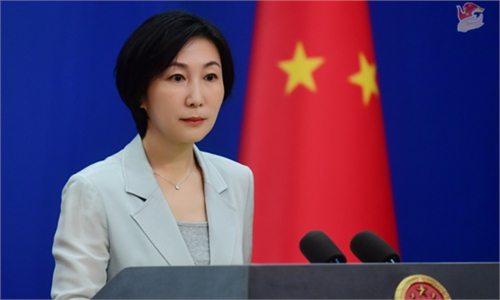
Illustration: Tang Tengfei /GT
Editor's Note:The world in 2024 has witnessed a clearer trend of changes unseen in a century, with the international situation characterized by intertwined chaos, escalating and prolonged geopolitical conflicts, an intensifying push for "decoupling," and the accelerating rise of the Global South. However, what is certain is that amid this volatile world, China has consistently strived to lead the trend of the times toward peace, development, and win-win cooperation, injecting valuable stability into a turbulent environment. The Global Times has selected the opinions of five renowned foreign experts to share their insights on China's role as an anchor of global stability and their expectations for Chinese diplomacy in the coming year.
Robert Lawrence Kuhn, chairman of The Kuhn Foundation and recipient of the China Reform Friendship Medal
2024 has been characterized by major conflicts between Russia and Ukraine and in the Middle East, along with various hot spots around the world that have been locally disruptive and destructive, even if less well-known - as well as continuing tensions between the US and China. In this environment, China has advised restraint, calling for political rather than military solutions, multilateral rather than unilateral oversight, and seeking win-win arrangements.
The world is increasingly divided, and China is facing challenges ranging from the Russia-Ukraine war to concerns over low-cost, good-quality Chinese electric vehicles. However, China's leadership historically, since the reform and opening-up policy in the late 1970s, has almost always preferred policies of stability and gradual, studied, careful change. Therefore, I foresee that in 2025, China will continue its international policies, seeking to promote multilateral global governance, increasingly engage with the developing world, especially through China's Global Development Initiative, and stabilize relations with the US and Europe.
George Tzogopoulos, a lecturer at the European Institute in Nice
As far as Chinese diplomacy is concerned (beyond relations with the US), I would like to emphasize China's interest in contributing to the reconciliation of different Palestinian groups. If the Middle East conflict is resolved in the future, Chinese mediation will possibly help the Palestinians speak with one voice in defense of their legitimate rights.
China is a critical pillar of the international system, making it natural for countries across the world to maintain good relations with it.
I expect China to contribute more to the reconstruction of underdeveloped countries (for example in Africa) and to undertake reconciliation initiatives. Its successful mediation between Iran and Saudi Arabia in 2023, for example, was important. Perhaps this mediation will be the beginning of new efforts. The situation in Yemen seems to be positively influenced by the momentum generated in regional affairs after Iran and Saudi Arabia re-established diplomatic relations.
Kim Heung-kyu, director of the US-China Policy Institute of Ajou University, South Korea
I am confident that China's foreign policy, which aims at creating favorable environment for economic development and ensuring stability in its neighborhood, significantly contributes to the world. Prioritizing stability is crucial, and China has made remarkable progress in this area, demonstrating to neighboring countries that stability is its top priority.
First and foremost, stability is very important for our region, as it provides both foreign and neighboring countries with the opportunity to develop bilateral relations and grow their economies. Western media often portray China as "aggressive" and "attempting to alter the status quo." However, Chinese diplomacy has prioritized stability, which serves as a key foundation for other countries to strengthen their relationships and focus more on economic growth during times of uncertainty and instability.
I hope China continues to prioritize stability, enhance its relationships with neighboring countries, and strengthen its ties with the Global South. This positive policy direction has the potential to elevate China's influence on the global stage.
Rupak Sapkota, former foreign affairs advisor to the prime minister of Nepal
China's diplomacy has had a profound positive impact on the global economy, opening new avenues for cooperation, especially for developing countries like Nepal. Chinese modernization resonates with the collective aspirations of the Global South, facilitating a smoother integration into the global community. Furthermore, China's diplomatic strategy provides a constructive pathway for these nations to navigate the shifting geopolitical landscape, enabling them to craft their own development trajectories while drawing inspiration from China's best practices.
The China-proposed Belt and Road Initiative (BRI) exemplifies this opportunity. It not only showcases China's diplomatic achievements but also offers a platform for significant development projects. With Nepal's inclusion in the BRI, we anticipate the realization of tangible projects that will enhance our connectivity infrastructure and invigorate our economy.
As we look forward to 2025, closer collaboration between China and other developing countries is crucial for tackling some of the most pressing global challenges, including economic development, food and energy security, poverty alleviation and climate change and beyond. Such partnerships present immense opportunities for developing countries, allowing them to leverage China's expertise and resources to tackle these critical issues and foster sustainable growth.
Warwick Powell, an adjunct professor at Queensland University of Technology, a senior fellow at Taihe Institute and a former advisor to Kevin Rudd, former Australian prime minister
The American unipolar moment is well behind us. While the collective West continues to seek to reclaim primacy across the globe - intensifying instabilities and kinetic risks in the process, China has offered a steady hand. Efforts by the collective West (in particular the US, backed by a $1.6 billion appropriation from Congress to do so) and associated mainstream media to demonize China and to "talk down" its economy have come to naught. China's domestic economic restructuring continues to take place in a steady fashion while maintaining targeted growth rates.
At the same time, China's external economic relations continue to expand rather than retreat. Trade and investment flows have consolidated over the past 12 months, particularly in relation to the countries of the Global Majority. This material reality contrasts sharply with the narrative-centric approach of the West.


